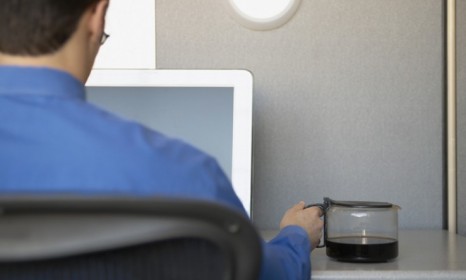
- Select a language for the TTS:
- UK English Female
- UK English Male
- US English Female
- US English Male
- Australian Female
- Australian Male
- Language selected: (auto detect) - EN
Play all audios:
If you can't live without a strong cup of coffee — or three — every morning, it might not be due to bad sleep habits or a lack of willpower. New research by the Harvard School of Public
Health and the National Cancer Institute, and published in the journal _PLoS Genetics,_ suggests that your genes might play a role in determing the amount of coffee you drink. Here, a brief
guide: WHAT DID THE RESEARCHERS FIND? They scanned genetic variations in 40,000 people who had participated in past dietary surveys, and found that two stretches of DNA known to be involved
in breaking down caffeine in the liver were more likely to be present in people who actually consumed more caffeine. That suggests that one reason behind the habits of heavy coffee drinkers
is that their bodies are better able to process caffeine quickly. SUBSCRIBE TO THE WEEK Escape your echo chamber. Get the facts behind the news, plus analysis from multiple perspectives.
SUBSCRIBE & SAVE SIGN UP FOR THE WEEK'S FREE NEWSLETTERS From our morning news briefing to a weekly Good News Newsletter, get the best of The Week delivered directly to your inbox.
From our morning news briefing to a weekly Good News Newsletter, get the best of The Week delivered directly to your inbox. HOW MUCH MORE COFFEE DO PEOPLE WITH THESE GENES DRINK? People with
the coffee-junkie DNA consumed about 40 extra milligrams of caffeine each day. That amounts to an extra cup of coffee or can of soda every day. BY WHY DOES THIS GENE MAKE PEOPLE DRINK MORE
COFFEE? The heavy drinkers metabolize caffeine faster, so the authors of the study figure that their bodies cry out for that next hit of coffee sooner than those who metabolize caffeine more
slowly. A free daily email with the biggest news stories of the day – and the best features from TheWeek.com SO IS COFFEE ADDICTION ALL IN THESE GENES? No. The DNA variations the
researchers found only accounted for about 1 percent of the total differences in caffeine consumption. That suggests that there may be other genes that also play a role in determining how
much caffeine our bodies can handle. "There are hundreds of genes known for specific medical conditions — for dietary consumption we know very little," study author Dr. Neil
Caporaso says, as quoted by _BBC News_. "Now, for the first time, we know specific genes that influence the amount of caffeine that individuals consume." SOURCES: _MSNBC_, _BBC
News_, _TIME_, _Boston Globe_